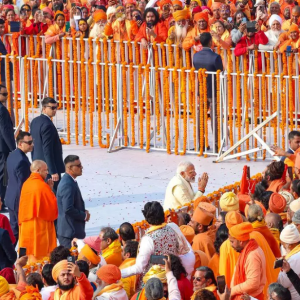
 Fr. Gaurav Nair
Fr. Gaurav Nair

India celebrated its 75th Republic Day on January 26, 2024. However, for some Indians, another event overshadowed it. Years after the Constituent Assembly, mostly comprised of Hindus, with a smattering of others, decided that India should be a nation where everyone would be treated equally irrespective of their religion, caste, class or anything else that is divisive and destructive, we are now en route to a definitive Hindu nation.
The grand event that transpired recently purportedly symbolises the liberation of a suppressed group or nation suppressed by centuries of colonialism. Scrutinised by rational minds, both arguments would not stand their ground. Why would anyone in their right mind celebrate Independence Day on August 15 unless we had shed the mantle of colonialism? The corollary would imply that the revelry associated with the aforementioned event extolled the effacement of something we had acknowledged and accepted—full marks to anyone who, at this juncture, recollected the Indian Constitution.
The preamble's commencement and the culmination "WE, THE PEOPLE OF INDIA" and "HEREBY ADOPT, ENACT AND GIVE TO OURSELVES THIS CONSTITUTION" amply corroborate the claim that there were no external agencies involved. Indeed, jettisoning the founding document of the great nation touted to lead others is the ictus of the whole debacle. Republic Day has thus become a mere farcical platform for the nation's president in dearth of avenues to manifest their comportment. Deletion of the values ennobled in our current Constitution also means disenfranchisement from all the rights they guarantee. We are exchanging the stable foundation that brought us this far with a phantasm impotent to buttress our aspirations.
As amusing as it was to see a social media post by someone with deep-seated feelings of inadequacy vindicating their ill-founded hatred of everything non-Hindu, it was unsettling that the students of reputed colleges and universities celebrated injustice and chaos. Hardly befitting of the "civilisational greatness" of a nation which Mr Modi, in his narcissistic delusions of grandeur, alludes to. The enchantment laid upon the masses lays inconspicuous to them.
Geoffrey Chaucer's sagacious quote, "For loue is blynd alday and may nat see" in The Merchant's Tale, astutely furnishes the raison d'etre of the irrational paroxysms of delectation and déraison that rack the myopic gaggle lately. In true filmi style, having precipitated hysteria of Hindu suppression, the thespians have popped up aplomb to "extricate" the damsel(s) in distress from the clutches of "the villians" inhumanly slaughtering the innocent. Unsurprisingly, the damsel must fall for their knight in shining armour. The veracity of the claim becomes inconsequential. Alas, I can hardly recommend a side of popcorn and soft drinks to such a thrilling show—the apprehension of what the "hero" might do to further the damsel's engrossment in himself forbids me.
India's greatness of yore refers to its profound and extensive intellectual foundation and ethical compass that steered public endeavours and personal aspirations in alignment with rich traditions that supported plurality, coexistence, and conscience. As many have indicated, Republic Day is a time to reflect on the extent of the application of our Constitution. Woefully, few remember that over the Temple, both friend and foe.
Jai Hind!